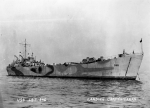NavSource Online: Amphibious Photo Archive

USS LST-396
Awards, Citations and Campaign Ribbons
Precedence of awards is from top to bottom, left to right
Top Row - Navy Unit Commendation
Bottom Row - American Campaign Medal - Asiatic-Pacific Campaign Medal (1) - World War II Victory Medal
LST-1 Class Tank Landing Ship:
Asiatic-Pacific Campaigns |
| Campaign and Dates |
|---|
| New Georgia Group operation
New Georgia-Rendova-Vangunu occupation, 1 July 1943 Vella Lavella occupation, 17 and 18 August 1943 |
"Although the massive fire that consumed the ship was initially thought caused by some type of enemy action, an investigation revealed that she was done in by her own design near Vella La Vella on 18 August 1942. On this day, LST-396 was attempting to put 400 drums of AVGAS, 400 drums of diesel, and 100 tons of ammunition ashore to replenish the men fighting their way across the island. Evidence strongly suggests that the most likely cause of the fire was from some of this fuel leaking onto the tank deck from a defective drum. The escape scuttle for port shaft alley was located on the tank deck. This scuttle was likely open as it was the only means to vent the fumes from shaft alley. This also allowed fuel vapors from the tank deck to accumulate in the port shaft alley through this same escape scuttle. When the two automatically operated, electric-driven fresh water pumps (also located in shaft alley) were turned on; they likely provided the spark that ignited the fuel vapor and set off a chain reaction that the crew could not hope to contain with the damage control assets at hand in this early design of the LST. The captain had no choice but to abandon ship. There were no casualties. Originally outfitted to carry tanks, the follow-on design (LST 542 class) featured design changes that better suited the general-purpose supply role for which these ships were needed. Among the changes were more robust damage control capabilities."
Brian Miller.
Specifications:
| Click On Image For Full Size Image |
Size | Image Description | Source | |
|---|---|---|---|---|
 |
255k | USS LST-396 at anchor, date and location unknown. | Brian Miller | |
USS LST-396
Dictionary of American Naval Fighting Ships (DANFS)
| Commanding Officers | ||
| 01 | LT. White, Eric Walter, USNR | 23 December 1942 - 18 August 1943 |
Crew Contact And Reunion Information
U.S. Navy Memorial Foundation - Navy Log
Additional Resources and Web Sites of Interest
The USS LST Ship Memorial
LST Home Port
State LST Chapters
United States LST Association
| Back To The Navsource Photo Archives Main Page | Back To The Amphibious Ship Type Index | Back To The Tank Landing Ship (LST) Photo Index |
| Comments, Suggestions, E-mail Webmaster. |
|
This page is created by David W. Almond and maintained by Gary P. Priolo |